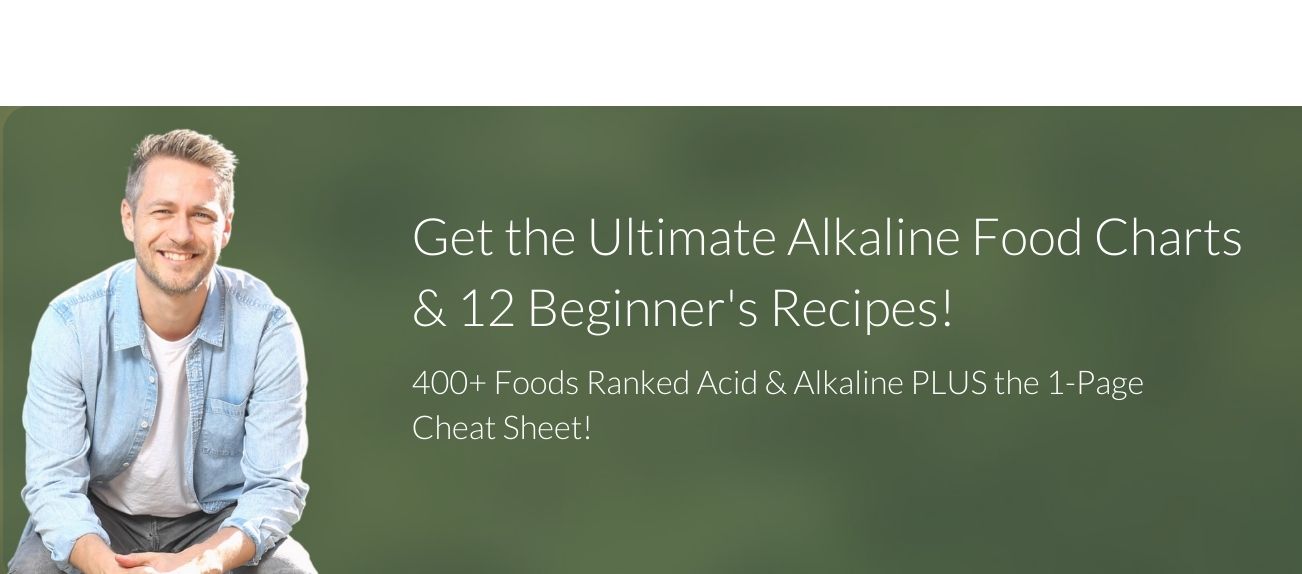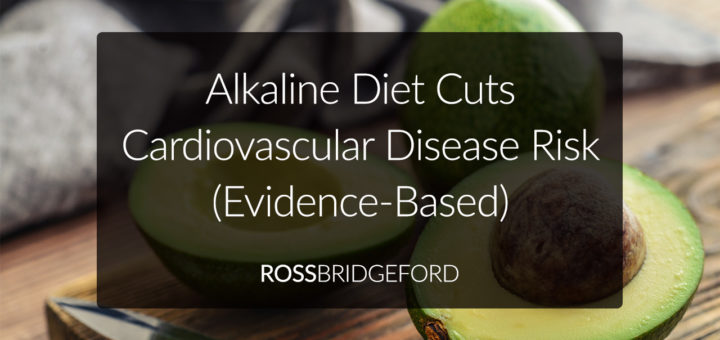Evidence-Based: Alkaline Diet Cuts Cardiovascular Risk
Research: Alkaline Diet Cuts Cardiovascular Risk
Cardiovascular risk is the biggest killer in the developed world. Alongside cancer and respiratory diseases, for most of us, it is one of these three that’s going to get us.
And while there is a growing market for nutrigenetics (insert link) (studying our genes to assess our health risks) I agree with Dr. Pete Attia you can save yourself a ton of money by simply look back a couple of generations on both of your parent’s sides and see what your grandparents and great grandparents died from and you know what you need to look out for!
It will generally be cardiovascular disease, cancer, or respiratory illness.
For 50% or more of us, we will be genetically predisposed to a risk of cardiovascular disease.
But for even more of us RIGHT NOW the risk will be real and present.
High blood pressure, excess body weight, high LDL cholesterol, type 2 diabetes and insulin resistance, smoking, stress…all of these are significant risk factors. And all are in our control.
The Risk Is In Your Control!
Cardiovascular disease is almost entirely preventable through lifestyle choices, and the research literature overwhelmingly shows us what we need to do!
If you are currently living with any one of these risk factors, and especially if you’re genetically at risk too, please read on, the data doesn’t lie!
Research Shows An Alkaline Diet Prevents Cardiovascular Disease & Reverses Risk
I have been sharing research and data around living alkaline and health for over 16 years, and it’s amazing to see the body of research grow so much. There are now literally several hundred, if not thousands, of high-quality research studies showing the efficacy and benefits of an alkaline diet for all manner of health goals.
What started as primary studies into the link between an alkaline diet and bone strength has now exploded out to cancer, diabetes, autoimmune, liver health, kidney health, sports performance, and recovery, cognitive function, and indeed cardiovascular health.
So let’s dig into some of that now, and then I’ll give you some next steps to get started.
STUDY ONE:
British Journal of Nutrition: Association between dietary acid–base load and cardiometabolic risk factors in young Japanese women
In this study of 1183 “generally healthy” young women, the researchers found that the more acidic the diet, the bigger the risk of cardiovascular disease. In looking back at those risk factors:
- waist circumference
- LDL cholesterol
- blood pressure
The researchers found that the acidity of the diet was positively associated with an increased risk on all three fronts, primarily due to the effect of an acidic diet increasing cortisol production (something I’ve discussed at length many times).
The study is also interesting in that the subjects were all young and healthy, and yet the higher the acidity in their diet, the risk still increased – the body of a young, healthy person is still prone to becoming imbalanced by an acidic diet.
Study conclusion:
“In a group of free-living young Japanese women, we found that higher PRAL and Pro:K (more acidic dietary acid–base loads) were associated with higher systolic and diastolic blood pressure after adjustment for possible confounding factors. We also found independent positive associations between PRAL and total and LDL-cholesterol, as well as between Pro:K and BMI and waist circumference. To our knowledge, this is the first study to examine the relationships between dietary acid–base load measures and cardiometabolic risk factors.”
Murakami K; Association between dietary acid–base load and cardiometabolic risk factors in young Japanese women; British Journal of Nutrition; Volume 100 , Issue 3 , September 2008 , pp. 642 – 651
STUDY TWO:
Journal of Hypertension: Diet-Dependent Net Acid Load and Risk of Incident Hypertension in United States Women
This study examined the association between the diet-dependent net acid load (and acidic diet) and the risk of hypertension among 87,293 women in the United States. The used the data from the Nurses’ Health Study II, and only included women who did not have a history of hypertension.
This study also separately analyzed the ratio of animal protein intake to potassium intake as an alternative evaluation of acid load (and to check that the association was not simply increased animal protein intake).
Their findings matched the first study, a high diet-dependent net acid load is independently associated with a higher risk of incident hypertension.
The women with the more acidic diets had higher BMI, were less physically active, and had lower intakes of folate, magnesium, and other essential nutrients.
Study conclusion:
Our prospective analysis suggests that a higher diet-dependent net acid load is independently associated with an increased risk of incident hypertension. Women eating “typical” American diets are already at increased risk for incident hypertension, and, thus, these results have substantial public health implications.”
Sidenote: isn’t it interesting that there are these studies, published in hugely respected journals, with real-world data, saying that their results have ‘substantial public health implications’, but yet the mainstream media, doctors etc. will tell you ‘the alkaline diet is a fad, there’s no evidence etc.!’
Zhang, L. Curhan GC, Forman JP; Diet-Dependent Net Acid Load and Risk of Incident Hypertension in United States Women; Hypertension. 2009;54:751–755
STUDY THREE:
Journal of Cardiovascular Diabetology: Association between dietary acid load and the risk of cardiovascular disease
This was a population-based, retrospectively registered cross-sectional study using nationally representative samples of 11,601 subjects.
They found a strong link between diet-induced acidosis and cardiovascular disease. Whereas the first study we discussed focused on younger women, this study also found that as we age, the risk increases.
“The average 10 year ACC/AHA ASCVD risk score increased as PRAL increased (from 8.5 to 9.6 %, P < 0.001, Fig. 2a), and the discrepancy among the tertiles was greater in the older age group (≥55 years)”
Importantly, and further highlighting just how essential it is to follow an alkaline lifestyle, the study STILL showed a strong link between an acidic diet and cardiovascular disease even when removing obesity, exercise and insulin resistance as variables. Acidity was still a strong risk factor independent of these other influences.
Interestingly, whereas the first study believed the link was between acidity leading to elevated cortisol, this study highlights the role of acidity increasing insulin resistance.
Study Conclusion:
“In this current large, nationally representative, population-based study, we demonstrated that people with higher diet-induced acid load had higher CVD risks in the general population. Diet-induced acid load was closely linked with CVD risk especially among middle-aged individuals. In addition, higher PRAL scores were associated with CVD risk independent of obesity, exercise, and insulin resistance, but not sarcopenia. This association remained significant after adjusting for other essential confounding factors.”
Han E, Kim G, Hong N; Association between dietary acid load and the risk of cardiovascular disease: nationwide surveys (KNHANES 2008–2011); Cardiovascular Diabetology volume 15, Article number: 122 (2016)
An Alkaline Diet Decreases Cardiovascular Disease Risk: Next Steps
These studies are just scratching the surface, there are are many, many more like these, and in the not-to-distant-future I will catalogue them all for you to be able to search and explore.
I have listed a few more below, in case you like to look through this stuff as much as I do!
But for now, what are your next steps?
To decrease the risk of cardiovascular disease, and increase your health and energy, you need to move from a more acidic diet and lifestyle to a more alkaline-forming diet and lifestyle.
I am always consistently using the term “lifestyle” because this is not a diet, and should not be seen as a ‘diet’ in that short-term sense. It is, and has to be, a lifestyle because you want these benefits to last forever, and keep growing and getting more and more powerful each and every day!
I also want to keep it simple, and if this is your first step towards a more alkaline lifestyle, I want to get you started with just a few simple steps.
There is nothing worse than overwhelm. It causes anxiety, frustration and inaction.
So we try to be an overwhelm-free zone 🙂
To begin, let’s describe an ‘alkaline diet’ in general:
To live alkaline means to consume predominantly alkaline-forming foods and drinks, while limiting acid-forming foods and drinks. Simple 🙂
Alkaline-forming foods include vegetables, salads, leafy greens, healthy fats, nuts, seeds, oily fish, and more. Think cucumber, spinach, kale, broccoli, tomatoes, avocados, chia, oats, almonds, beans and pulses, coconut (cream, oil, milk), lower-sugar fruits such as berries, grapefruit, lemons and lime, rice and more.
Basically fresh, unprocessed foods that you probably already intuitively know are good for you!
Acid-forming foods include sugar, gluten, processed foods, packaged foods, dairy, meat, and so on. Think sweets, microwave meals, takeaway, bacon, trans-fats, gluten-containing bread and pasta, condiments, chocolate, pizza, beer, chips etc.
Again, foods you probably intuitively know are NOT good for you.
Now – this is important – this is not to say you have to eat perfectly, 100% alkaline and zero acidic. That is not the case.
Life is about balance. But you should aim to eat predominantly alkaline-forming foods and then allow yourself to have a coffee, glass of wine, chunk of chocolate, meal out with friends or family, etc. guilt-free…and then back to being more on the alkaline side of things!
Where to Start:
I want to give you some light reading to get started, and the very best place to start is here:
==> CLICK HERE for My Beginner’s Guide to the Alkaline Diet
This gives a bit of extra detail on the above AND gives you my four most important steps to take to start your journey.
If you want to then go a bit deeper, here are some extra guides, that may also answer some of the questions you might have:
- Alkaline Diet Myths & Truths
- Why Eat Alkaline When the Stomach Is Acid?
- Can I Eat Meat on an Alkaline Diet?
- What About Fruits?
- The Guide to Alkaline Water
This should be enough to get you started!
Do You Want a New Recipe From Me Every Friday?
Each Friday I email out a brand-new recipe that is high-alkaline, quick, easy and delicious.
Recent recipes have included my 5-Minute Alkaline Dhal, Sugar-Craving Busting Juice, Creamy Broccoli, Leek & Ginger Soup, and my Salted Caramel Slice.
It’s my way of giving you a little deliciousness to take into the weekend, when you’ve got a bit more time on your hands to try something new.
I call it the “Recipe for the Weekend (RFTW)” and you can sign up for it below.
Until then, I hope you’ve enjoyed this guide and the research, and I’ll see you soon.
Let’s do this!
Ross
Further References:
Parohan M et al; Dietary acid load and risk of hypertension: A systematic review and dose-response meta-analysis of observational studies; SYSTEMATIC REVIEWS AND META-ANALYSES| VOLUME 29, ISSUE 7, P665-675, JULY 01, 2019
Mazidi M, Mikhalidis DP, Banach, M; Higher dietary acid load is associated with higher likelihood of peripheral arterial disease among American adults; Journal of Diabetes and its Complications; Volume 32, Issue 6, June 2018, Pages 565-569
Daneshzad E.; Dietary acid load and cardiometabolic risk factors: a systematic review and meta-analysis of observational studies; Public Health Nutrition, Volume 22 Issue 15, 24 May 2019
Dehghan P, Farhangi MA. Dietary acid load, blood pressure, fasting blood sugar and biomarkers of insulin resistance among adults: Findings from an updated systematic review and meta-analysis; International Journal of Clinical Practice; Volume 74, Issue 4, April 2020
Chen SW; Elevated hypertension risk associated with higher dietary acid load: A systematic review and meta-analysis; Clin Nutr ESPEN 2019 Oct;33:171-177.






I want to say a HUGE thank you to you Ross for your research and Alkaline diet and recipes which you so generously share, it makes it so much easier to follow the Alkaline lifestyle with tasty and easy recipes. I am always passing on your name and recommend ing your book. I am 65 and generally very healthy but noticed my finger joints swelling and stiffening. When I eat Alkaline swelling and stiffness disappear. I hope to continue being healthy and active and follow your recommendations for a very long time . Thank you 😊
Ross, it is so good that you include references in your information… especially good for lukewarm folks like my husband…!
I am wondering if you have any information about helping atypical cells become normal again. I have been diagnosed with ductal hyperplasia with atypia, and it is not the first time that atypical cells have been found in other biopsies…Your information about EMFs had already gotten me thinking, and then I read that atypical cell can grow more normal if one can find/eliminate the cause. But what is the likely cause?
Hi Ross:
Andrew Siben here. I have been reading your books and e mails for years. I have been a
pescatorian for 48 yrs. I regularly exercise, practice Wm Hoff method of breathing , take cold showers
each AM and meditate daily. Yet I have a nail fungus that began 40 yrs ago, initially on my toes on both
feet and now only on the finger nails of my right hand only. I have tried so many topicals and natural products. I drink green drinks 2 glasses every am for yrs. I have desparately sought a solution. Any thoughts how I can conquer this bacteria/fungus .I look forward to your reply